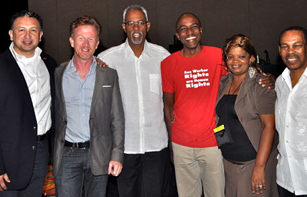
(from left) Miguel Bustos, Senior Program Manager at the Levi Strauss Foundation; John Hassell, UNAIDS Caribbean Senior Adviser for Regional Partnerships; Ernest Massiah, UNAIDS Caribbean Regional Support Team Director; Maurice Tomlinson, AIDS Free World attorney and advocate; Miriam Edwards, Guyana Sex Worker Coalition President; Edward Greene, UN Special Envoy on HIV/AIDS for the Caribbean.
Credit: UNAIDS/Daniel Volmy
The UNAIDS Caribbean Regional Support Team launched the Caribbean Coalition for Social Justice (CCSJ) during the 2011 Caribbean HIV Conference, held in the Bahamas in November. The Barbados-based Coalition will pool resources and provide legal services for people in the region who have been victims of arbitrary acts of discrimination but do not have access to the courts.
“The most vulnerable groups of Caribbean society often have no access to the justice system when their rights are violated based on race, gender, sexual orientation, or HIV status,” said Dr Ernest Massiah, Director of the UNAIDS Caribbean Regional Support Team. “This new organisation will address legitimate human rights violations in courts of law as well as regional and international human rights tribunals.”
United Nations Special Envoy on HIV/AIDS for the Caribbean, Dr Edward Greene, welcomed the newly formed Coalition, saying that it was a significant step for the region toward fulfilling its obligations to protect human rights and fundamental freedoms. “The creation of the Caribbean Coalition for Social Justice will give us hope that we can eliminate discrimination,” said Dr Greene.
The most vulnerable groups of Caribbean society often have no access to the justice system when their rights are violated based on race, gender, sexual orientation, or HIV status
Dr Ernest Massiah, Director of the UNAIDS Caribbean Regional Support Team
The Caribbean HIV Conference brought together researchers, policy-makers and advocates to discuss ways to scale-up the HIV response in the Caribbean. “We’ve reached the peak in resources and probably global interest,” said Alan Whiteside, professor at the Health Economics and HIV/AIDS Research Division of the University of KwaZulu-Natal in South Africa, speaking at the conference. Prof Whiteside said the Caribbean urgently needed to scale up effective prevention methods and find effective approaches for fostering behaviour change, including fewer sexual partners, fewer concurrent partners and reduced substance abuse.
Amalia Del Riego, Senior Adviser at the Pan American Health Organisation HIV Caribbean Office, highlighted several of the region’s successes - progress in eliminating mother-to-child HIV transmission, mortality reduction, and increased access to HIV testing and treatment services.
Despite this progress, several gaps need to be addressed in the region. Ms Del Riego noted that in some countries between 30 and 40 percent of funds assigned to the HIV response are spent on administrative costs. Men who have sex with men (MSM), sex workers and young people continue to have limited access to services. Furthermore, many of the activities under the HIV prevention umbrella cannot be linked to concrete results.
The Caribbean continues to have one of the highest regional HIV prevalence rates after sub-Saharan Africa, although the epidemic has slowed considerably since the mid-1990s.
To contribute to or learn more about the Caribbean Coalition for Social Justice, email hassellj@unaids.org.




